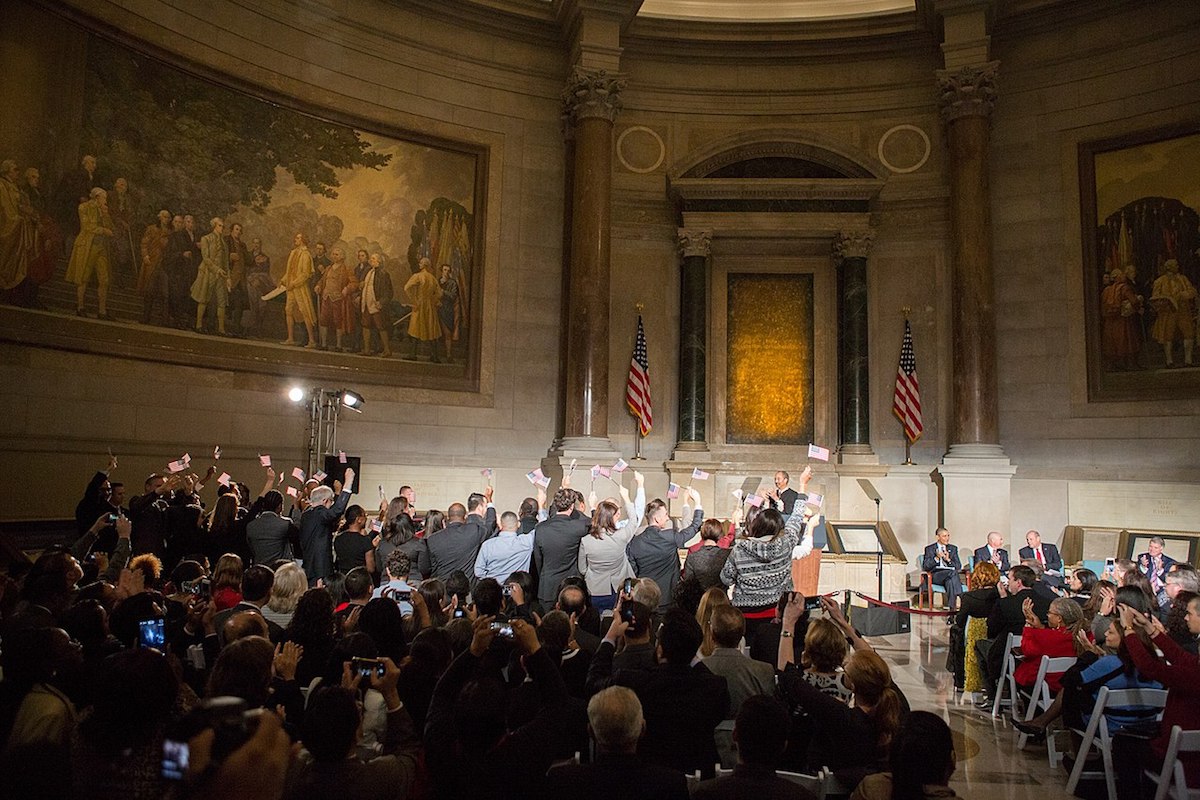

A Naturalization Ceremony (Public Domain)
What You Should Know
- The President cannot amend the Constitution with an executive order:The 14th Amendment of the Constitution granted citizenship to all persons born or naturalized in the United States—including formerly enslaved people—and guaranteed all citizens “equal protection of the laws.” The amendment itself is really clear. The President can talk about this all he wants, but as long as there’s a Constitution, he doesn’t have the power to unilaterally change it. More: WashPo, Think Progress, and WSJ
- If he cannot amend the Constitution unilaterally, all he is doing is playing politics: There’s a reason this story is being stoked right before the election: to motivate a base of supporters and voters who chant, “blood and soil, [Jews and immigrants] will not replace us” at white supremacist rallies. In the past week alone there have been a number of incidents being investigated as potential hate crimes or terrorist attacks against Americans who are Jewish, immigrant, and/or Black.
- These actions distort what citizenship means to America: Ryan Eller, Executive Director of Define American, says “While of course we recognize the reason for the timing of this conversation, at Define American we welcome discussions about citizenship because it requires people (like the President) who are not Native American or whose ancestors were enslaved to answer what they did and are doing now to earn their citizenship. It begs us to consider whether or not we still believe in an America where anybody has an opportunity at full participation and citizenship, regardless of the circumstances in which they happened to be born.”
Why the 14th Amendment Matters
Elizabeth Wydra, President of the Constitutional Accountability Center puts it best here and below:
“The 14th Amendment is among the greatest provisions of our Constitution, in part because of its profound guarantee of citizenship to all who are born on American soil. With the ratification of this amendment —after hundreds of years of chattel slavery followed by a bloody Civil War that cost hundreds of thousands of lives —America’s Second Founders decided to bend the arc of our Constitution toward progress.
“After the Civil War, when members of the Reconstruction Congress assembled to draft the amendment’s birthright citizenship clause, they were writing against a backdrop of prejudice not only against African Americans, but also immigrant communities including the Chinese and Roma.
“Much of the hostility against these immigrants was based on the same resentment toward immigrants in the United States today: that they would take away good jobs from people already here (while exhibiting a willingness to allow them to take jobs perceived as undesirable); that waves of immigrants were “invading,” or, in the words of President Trump, “infesting” the country; and that they were arriving with different cultures and languages.”
There is also this from Constitution Daily:
“Including the first 10 amendments, the Bill of Rights, which were ratified in 1789, the Senate historian estimates that approximately 11,699 amendment changes have been proposed in Congress through 2016. Only one amendment, the 18th Amendment that established Prohibition, was later repealed by the states.
“Changing the actual words of the Constitution takes an amendment, as does actually deleting, or repealing, an amendment.
“In simple odds, the chance of any constitutional amendment being repealed would be roughly the same as a person living to 80 years old being struck by lightning during their lifetime, according to National Weather Service data.”
How Can We Expand the Scope of This Conversation?
- This administration’s attempts to change birthright citizenship laws are a part of our nation’s ugly history of attempting to disenfranchise communities of color. When we have conversations about citizenship, let us remember to include the full breadth of American history.
- To help our country reconcile its painful past with this moment, we must have uncomfortable conversations around topics such as the Grandfather Clause, a racist statute enacted in 1898 to allow poor, uneducated whites to vote while limiting the voting rights of black citizens.
- Following the American Civil War and the 14th Amendment, which extended citizenship to Blacks, the 15th Amendment was ratified, providing a mandate that “the right of citizens of the United States to vote shall not be denied or abridged… on account of race, color, or previous condition of servitude.”
***
Kristian Ramos is Communications Director for Define American.
About Define American
Define American is the nation’s leading nonprofit media organization that uses the power of story to transcend politics and shift the conversation about immigrants, identity, and citizenship in a changing America. It was founded in 2011 by Pulitzer Prize-winning journalist and Emmy-nominated filmmaker Jose Antonio Vargas. For more information, visit defineamerican.com.


